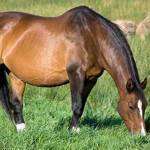Watch Broodmares on Spring Fescue Pastures

The mild weather of late winter has triggered early pasture growth in Kentucky and some surrounding states, and this may not be good news for broodmares in late pregnancy, depending on what is growing in those pastures.
At this time of year, fescue plants are normally dormant and the level of ergovaline, a toxin produced by a fungus in the fescue plant, is low. With this year’s warmer weather, grazing broodmares could encounter fescue in active growth much earlier than usual and might be at risk for fescue toxicity. This condition is associated with prolonged pregnancy, difficult birth because of thickened placental tissues, weakened foals, and absence of milk production by the mare. Taking pregnant mares off pastures with actively growing fescue is the best way to avoid problems with fescue toxicity.








